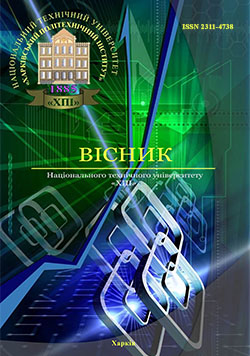MANAGEMENT OF INTEGRATION RISKS IN PROJECTS OF MULTIMODAL COMPLEXES
DOI:
https://doi.org/10.20998/2413-3000.2016.1174.6Keywords:
multimodal logistics complex, integration communications, logistics integration, project integration, integration risksAbstract
The authors of the article describe the features of integration in projects of multi-modal logistics complex (MLC). Classification of the multimodal logistics complex projects was conducted. Substantiated expediency synthesis logistics and project approach to the analysis of the projects risk of the MLC. The authors of the necessity of introducing the determination ―Project risk of multi-modal logistics complex. Especially the risks of rupture of integration relations in the project were identified. The necessity of allocating the integration project risks multimodal logistics complex in a separate group of risks that require careful study and management as such that affect system integrity MLC projectReferences
Gadzhinskij A. M. (1999). Logistika [Logistics]. (2d ed). Moscow: Informacionno-vnedrencheskij centr «Marketing» [in Russian].
Sergeev V. I. (2013). Korporativnaja logistika v voprosah i otvetah [Corporate logistics in questions and answers]. V. I. Sergeev (Ed). Moscow: INFRA-M [in Russian].
Procenko I. O. (2006). Koncepcija upravlenija cep'ju postavok i potencialy preimushhestva s pozicii integral'nogo menedzhmenta [Supply Chain Management and and the potential benefits from the position integral management]. Rossijskoe predprinimatel'stvo, 2 (74), 20–25 [in Russian].
Melnikov O. N. (2013). Logistika intellektual'no-kreativnoj dejatel'nosti pri organizacii vypolnenija biznes-proektov [Logistics of intellectual and creative activity in realization of business projects]. Rossijskoe predprinimatel'stvo, 24 (246), 153–158 [in Russian]. doi.org/10.18334/rp.14.24.1721
Kulagovsky T. A. (2012). Analiz i ocenka riskov v processe upravlenija tovarno-material'nymi zapasami [The analysis and assessment of risks in management of inventory holdings]. Vestnik Severo-Kavkazskogo gumanitarnogo instituta, Vol. 1, 4, 72–76 [in Russian].
Kolga P. V. (2014). Metody upravlenija logisticheskimi riskami na promyshlennyh predprijatijah [Methods of control over the logistic risks at the industrial enterprises]. Mezhdunarodnyj zhurnal prikladnyh i fundamental'nyh issledovani, 8, 95–98 [in Russian].
Mamchyn M. M. & Rusanovska, O. A. (2011). Vplyv lohistychnykh ryzykiv na pidvyshchennya efektyvnosti diyal'nosti pidpryyemstv [Influence of logistic risks on increase of to efficiency of activity of enterprises]. Visnyk Natsional'noho universytetu «L'vivs'ka politekhnika». Seriya «Menedzhment ta pidpryyemnytstvo v Ukrayini: etapy stanovlennya i problemy rozvytku», 720, 45–51. Retrieved from http: // archive.nbuv.gov.ua / portal / natural / vnulp /menegment /2011_720/07.pdf. [in Ukrainian].
Rovenskih M. V. (2008). Upravlenie riskami logisticheskoj sistemy promyshlennogo predprijatija [Risk management is the logistics system of an industrial enterprise]. Extended abstract of candidate’s thesis. Sankt-Peterburg [in Russian].
Fuchs H. & Wohinz J. W. (2009). Risk management in logistics systems. Advances in Production Engineering & Management, Vol. 4, 4, 233–242 Retrieved from http://maja.uni-mb.si/files/APEM/APEM4-4_233-242.pdf [in English].
Pletneva N. G. (2008). Teorija i metodologija upravlenija logisticheskimi sistemami v uslovijah neopredelennosti [The theory and methodology of logistics systems in the conditions of uncertainty]. Extended abstract of candidate’s thesis. Sankt-Peterburg [in Russian].
Vitlinskyy V. V. & Skitsko V. I. (2013). Kontseptual'ni zasady modelyuvannya ta upravlinnya lohistychnym ryzykom pidpryyemstva [Conceptual grounds of modelling and managing logistics risk of an enterprise]. Problemy ekonomiky, 4, 246–251. nbuv.gov.ua. Retrieved from: http://nbuv.gov.ua/UJRN/Pekon_2013_4_32 [in Ukrainian].
Rukovodstvo k Svodu znanij po upravleniju proektami (Rukovodstvo PMBOK) [A Guide to the Project Management body of knowledge (PMBOK Guide)], (5 ed.) Project Management Institute, Inc., PMI [in Russian].
Nozdrina L. V., Yashchuk, V. I. & Polotay O. I. (2010). Upravlinnya proektamy [Project Management]. L. V. Nozdrina (Ed.). Kiev: Tsentr uchbovoyi literatury. [in Ukrainian].
Boldyreva T. V. & Kovtun, T. A. (2003). Metodika ocenki jeffektivnosti investicionnogo proekta s uchetom situacij riska [Methods of assessing the effectiveness of the investment project taking into account situations of risk]. Metodi ta zasobi upravlіnnja rozvitkom transportnih sistem: zbіrn. nauk. prac', 6, 237–255 [in Russian].
Korol'kova E. M. (2013). Risk-menedzhment: upravlenie proektnymi riskami [Risk-management: management of projects’ risks]. Tambov: Izd-vo FGBOU VPO «TGTU» [in Russian].
Koshelevskij I. S. (2012). Obzor metodov upravlenija proektnymi riskami [Review of the methods of project risk management]. Problemy sovremennoj jekonomiki: materialy II mezhdunar. nauch. konf. (g. Cheljabinsk, oktjabr' 2012 g.). Cheljabinsk: Dva komsomol'ca, 164–166 [in Russian].
Downloads
Published
Issue
Section
License
Copyright (c) 2016 Татьяна Антоновна КОВТУН, Татьяна Николаевна СМОКОВА

This work is licensed under a Creative Commons Attribution-NonCommercial-ShareAlike 4.0 International License.
Our journal abides by the Creative Commons copyright rights and permissions for open access journals.
Authors who publish with this journal agree to the following terms:
Authors hold the copyright without restrictions and grant the journal right of first publication with the work simultaneously licensed under a Creative Commons Attribution-NonCommercial-ShareAlike 4.0 International License (CC BY-NC-SA 4.0) that allows others to share the work with an acknowledgement of the work's authorship and initial publication in this journal.
Authors are able to enter into separate, additional contractual arrangements for the non-commercial and non-exclusive distribution of the journal's published version of the work (e.g., post it to an institutional repository or publish it in a book), with an acknowledgement of its initial publication in this journal.
Authors are permitted and encouraged to post their published work online (e.g., in institutional repositories or on their website) as it can lead to productive exchanges, as well as earlier and greater citation of published work.

